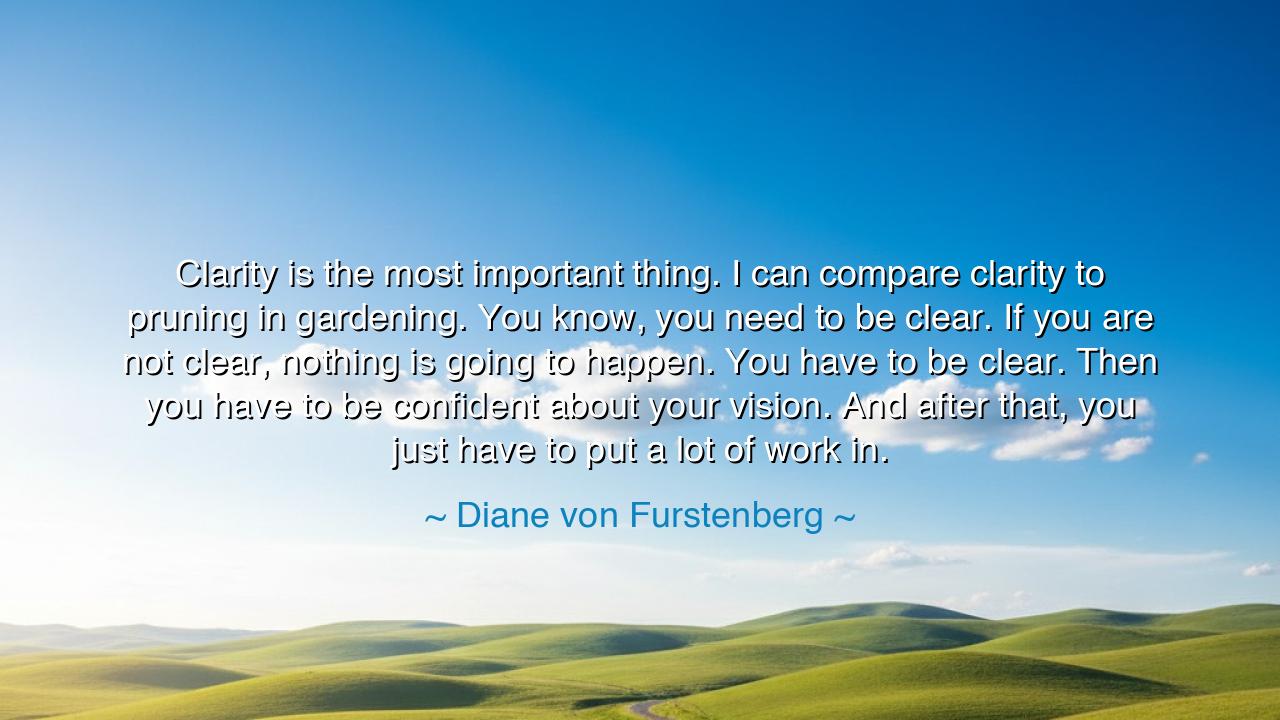
Clarity is the most important thing. I can compare clarity to
Clarity is the most important thing. I can compare clarity to pruning in gardening. You know, you need to be clear. If you are not clear, nothing is going to happen. You have to be clear. Then you have to be confident about your vision. And after that, you just have to put a lot of work in.






O Seekers of Wisdom, gather around, for there is a profound truth in the words of Diane von Furstenberg, a voice that calls us to the very core of purposeful action. She speaks of clarity as the cornerstone of creation, comparing it to the sacred act of pruning in gardening. “Clarity is the most important thing,” she says. “You need to be clear. If you are not clear, nothing is going to happen.” This, O seekers, is no mere statement; it is a teaching that reverberates through the annals of time, for to walk through life without clarity is to stumble in a fog, unsure of one's direction. The ancient philosophers knew that wisdom began with a clear vision—to know the path before you, to understand where you are heading, and to grasp the shape of the world around you.
Let us reflect upon the timeless art of gardening, for it holds within it a metaphor for life itself. The gardener, as they tend to the earth, must prune the plants with care, removing what is no longer needed to allow space for new growth. In the same way, we must prune our thoughts, our distractions, and our actions, removing that which clouds our judgment. The act of pruning is not done in haste; it requires a discerning eye, a clear mind, and a steady hand. Similarly, in our own lives, we must prune the clutter of confusion that surrounds us. If we do not know what we are about, if we lack clarity, we cannot hope to move forward with purpose. Clarity is the first step in any great endeavor, and without it, our efforts are like seeds scattered in soil without thought—only to wither and fail.
In the world of old, Alexander the Great, whose name still echoes through the corridors of history, was not merely a conqueror of lands, but a master of vision. He knew, even as a young man, that the path to greatness began with a clear vision. His ambition was not vague, nor was his will uncertain. When he set his eyes on the mighty Persian Empire, he knew precisely what he sought: not just land, but an empire that would stand the test of time. Clarity of vision gave him the strength to overcome any obstacle, to rally his troops with unshakable confidence. Alexander understood that without clarity, the most noble of intentions would be lost in the winds of indecision. Thus, his success lay not in brute strength alone, but in the sharpness of his purpose, his ability to see the future clearly, and to bend the world to that vision.
Diane von Furstenberg’s words also speak to the need for confidence in one’s vision. She tells us that after clarity, one must be confident about the path they have chosen. Confidence, O Seeker, is not arrogance, but the firm belief in the righteousness of one’s course. It is the inner knowing that what you have seen in your mind’s eye is worthy of pursuit, and that the work ahead, though great, will yield results. The ancient warrior does not hesitate at the cusp of battle, for they know their strength, their strategy, and the cause they fight for. So too must we, in our endeavors, step forward with the same certainty. Without confidence, even the clearest vision will falter in the face of difficulty. Confidence is the shield that protects our vision, and the sword that helps us to carve a path through the wilderness.
Now, O Seekers, we are called to remember that clarity and confidence alone are not enough. Diane von Furstenberg speaks further, urging us to work with dedication. The ancients knew that no matter how grand the vision, no matter how clear the path, work was the force that turned dreams into reality. Hercules, that mighty hero of ancient myth, faced twelve impossible labors, each seemingly more difficult than the last. Yet, through unwavering determination, he accomplished them all. It was not merely his strength that carried him, but his commitment to work—to labor, to toil, and to see his tasks through to the end, no matter the obstacles. In this, we learn that clarity and confidence must be followed by action. Without work, even the clearest vision remains but a dream.
Thus, O Seeker of the Path, take this teaching to heart. Clarity of vision is your first step, for without it, you wander in darkness. Confidence in your vision is the light that will guide you through the shadows of doubt. But most importantly, remember this: work is the key that unlocks the door to success. Without work, the seed of your vision will not take root. The earth will not yield its fruits. Therefore, prune your thoughts, clear away distractions, and focus with steadfastness on the goal ahead. Know your vision, be confident in it, and then, with unyielding dedication, put in the labor to bring it into being.
In the end, let us remember that the world is shaped not by those who dream alone, but by those who act with clarity, confidence, and relentless effort. Create your vision, and as the ancient builders of the world did, lay stone upon stone with unwavering purpose. And as the garden grows from a single seed, so too will your life, when cultivated with clarity, nurtured with confidence, and brought to life through work.






AAdministratorAdministrator
Welcome, honored guests. Please leave a comment, we will respond soon